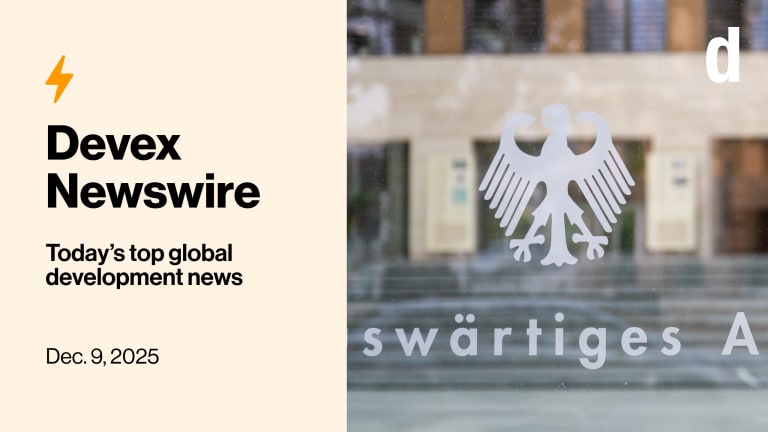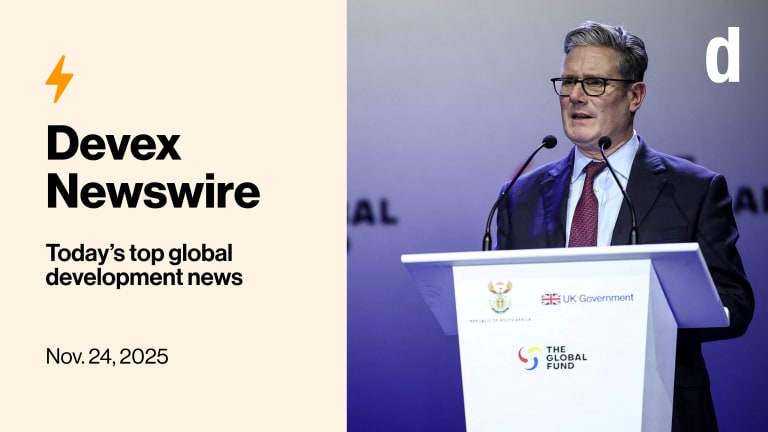
BRUSSELS — A donor conference on Venezuela held in Brussels on Tuesday saw the proposal of an initiative to better link global funders with governments in the region. However, the worsening humanitarian crisis remains steeply underfunded, with few new commitments made and attention shifting to the need for an official pledging conference.
“The serious and deteriorating political, human rights, and socioeconomic crisis” could see 6.5 million Venezuelans displaced outside their country by the end of 2020, according to a release from the co-chairs of the two-day International Solidarity Conference — Federica Mogherini, the European Union’s foreign affairs chief; Filippo Grandi, United Nations high commissioner for refugees; and António Vitorino, director general of the International Organization for Migration.
Mogherini told reporters Tuesday that despite this week’s event not being a pledging conference, “more or less €120 million were announced … as additional contributions from individual delegations.” However, that figure largely consisted of existing commitments. Asked by Devex for additional information, the European Commission confirmed that it included a €50 million commitment from Spain, announced earlier this month; £30 million ($34.7 billion) from the United Kingdom, announced in September at the U.N. General Assembly; and $6 million from the Global Fund to Fight AIDS, Tuberculosis and Malaria that is awaiting approval from the fund’s board.
Up to Monday, the U.N.’s humanitarian appeal for $738 million was only 52% funded, Grandi told reporters. “I think that this conference will help increase that percentage. But we are still far away from being fully funded," he added. Next year’s appeal, to be launched in Bogotá in November, is expected to nearly double the current ask.
The coordination initiative proposed at this week’s meeting aims to better connect international donors with nearby countries participating in the Quito Process — an intergovernmental mechanism to oversee the regional response to the crisis. Those countries, including Colombia, Argentina, and Brazil, have taken the lead in caring for the 4.5 million people who have left Venezuela.
Grandi told Devex that until now the Quito Process had been “a bit disconnected” from efforts to mobilize large donors. Now, he said, the hope was that the new “Group of Friends of the Quito Process” — made up of “essentially donor countries,” with its first meeting to be chaired by the EU in the coming months — would provide the foundation for a pledging conference in 2020.
“Before being able to organize a successful pledging conference, it is necessary to mobilize concrete political commitment by bringing together all partners,” an EU source told Devex, speaking anonymously according to institutional rules. “The urgency of this multidimensional crisis made it necessary to act as soon as possible. Organizing this solidarity conference was a first step in this regard. But this is not a one-off, it’s the start of a sustained effort to create awareness and mobilize more technical and financial resources.”
Grandi told Devex that despite the urgency to boost funding, a pledging conference was not possible this week as “simply there was no time to prepare it.” He said the situation was made more challenging by the changeover to a new European Commission, and that this week’s meeting was prepared within the past month, “when we realised that the [U.N.’s] humanitarian appeal was not sufficiently supported.”
European donors have come in for criticism for their sluggish response to the Venezuelan crisis, in contrast to their focus on refugees and migrants from Africa heading to Europe.
“We have already mobilized €172 million to support Venezuela and the region since 2018,” the EU source said, adding it would be for the next commission “to make detailed commitments.” But “the aim is to maintain a similar level of political and financial engagement in 2020 to address this crisis,” the source said.
“There is no donor fatigue that is rational enough to prevent us from mobilizing resources,” Mogherini claimed Tuesday. “We Europeans know very well: If we had invested a little bit to support the Syrian refugee crisis, or other migrant crises, early in the process, we would have not only saved lives but also saved money.”
Sanj Srikanthan, senior vice president for Europe at the International Rescue Committee, also made the link with Europe’s recent experience with irregular migrants.
“Unlike many countries in the northern hemisphere, which have been closing their doors to refugees and migrants, Venezuela’s neighbors have shown relative welcome,” Srikanthan told Devex. “But, there are already cracks that will deepen in the absence of adequate and context-appropriate financial support and diplomatic effort to increase burden-sharing and regionalize the response.”
The EU source said, “We may expect a pledging conference in coming months, but there is no final decisions about dates so far.”








